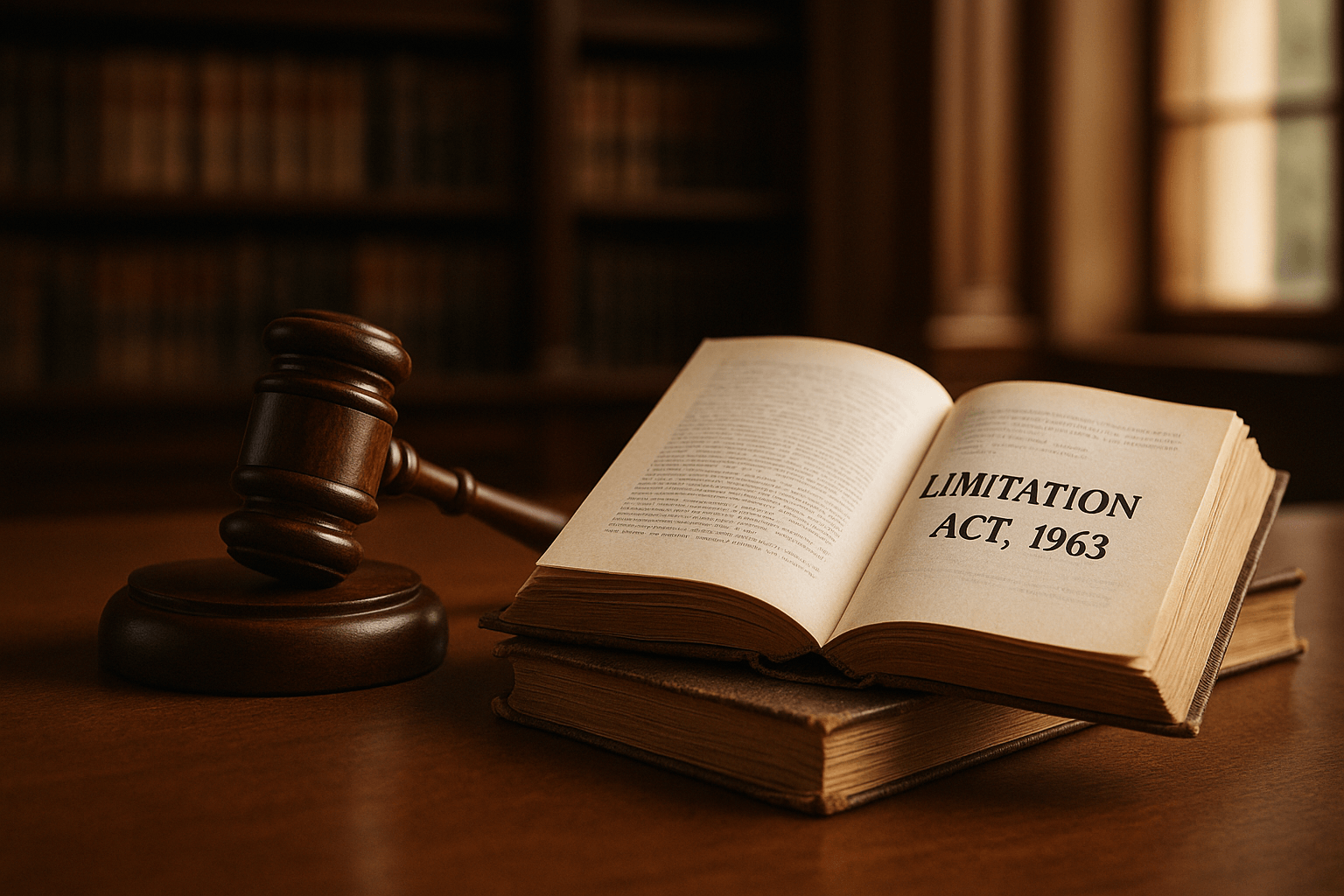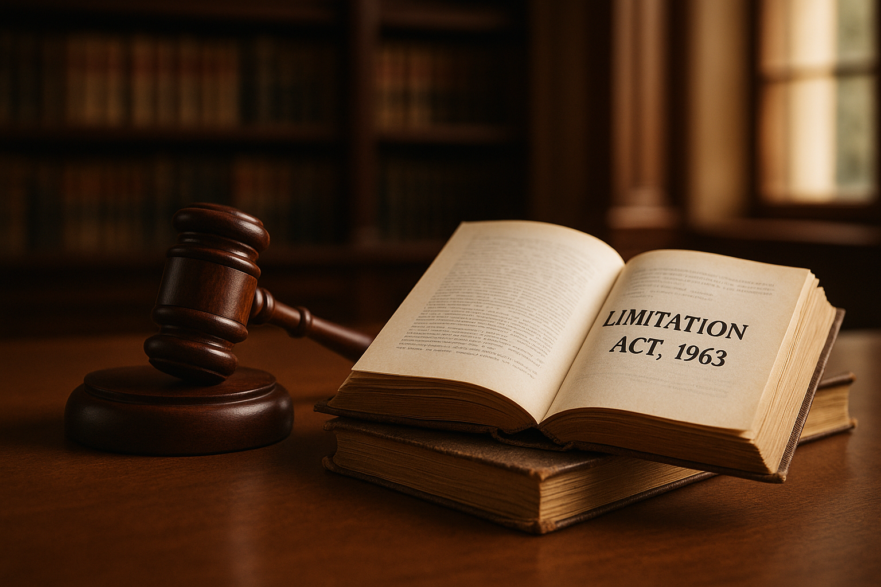
⚖️ THE LAW OF ADVERSE POSSESSION
EXTINGUISHMENT OF RIGHT TO PROPERTY
‘Nec vi, nec clam, nec precario’
📘 TOPICS
- What is meant by adverse possession
- Nec vi, nec clam, nec precario’
- THE AYODHYA JUDGMENT
- M Siddiq v. Mahant Suresh Das [2019 SC]
- Secretary of State for India v. Debendra Lal Khan [1933 PC]
- Smt. Pilla Akkayyamma v. Channappa [2015 Kar]
- Continued illegal possession ripens into a legally enforceable right
🏛️ Supreme Court in the Ayodhya judgment on Section 27 Limitation Act
- The possession has to be to the knowledge of the true owner in order for it to be adverse.
- Possession should meet the requirement of being “nec vi nec clam and nec precario”.
⚖️ Privy Council in Secretary of State for India v. Debendra Lal Khan [1933]
- The ordinary classical requirement of adverse possession is that it should be nec vi nec clam nec precario.
📚 Preparation for RJS, DJS, PCS (J) and other Judicial Service exams
The Limitation Act is an important component of any and every Judicial Service exam in the country. Its thorough knowledge is a must for all aspirants of RJS, DJS, PCS (J) and every other Judicial Service exam. To help such aspirants, DELHI LAW ACADEMY JAIPUR has launched a series of study material modules on all important aspects of this important part of their syllabus.
📜 EXTINGUISHMENT OF RIGHT TO PROPERTY — Section 27
- At the determination of the period hereby limited to any person for instituting a suit for possession of any property
- His right to such property shall be extinguished
🧾 Explanatory Notes from DLA on Section 27:
Time limited by the Schedule for instituting a suit for possession of property:
🏠 Immovable Property
- Sl. No.: 65
- Suit for possession of immovable property based on title
- Period of Limitation: Twelve years
- Time from which Period Begins to Run: When possession of defendant becomes adverse to plaintiff
💎 Movable Property
- Sl. No.: 68 — Suit for specific movable property lost or acquired by theft or dishonest misappropriation
- Period of Limitation: Three years
- Time from which Period Begins to Run: When the person having the right to the possession of the property first learns in whose possession it is
- Sl. No.: 69 — Suit for other specific movable property
- Period of Limitation: Three years
- Time from which Period Begins to Run: When the property is wrongfully taken
⚖️ THE LAW OF ADVERSE POSSESSION
🔍 What is meant by adverse possession?
- Possessio nec vi nec clam nec precario: Possession neither by force, nor secretly, nor by entreaty.
📜 Latin maxim
- ‘Nec vi, nec clam, nec precario’
- Meaning: ‘without force, without secrecy, without permission’.
📖 Principle
- It is the principle by which rights may be built up over time, principally public rights of way.
- If a path is used openly, not against protests, but without permission of the landowner – for an extended period (20 years) – a permanent legal right to such use is established.
- It is also relevant to easements, where the law ‘prescribes’ an easement in the absence of a deed.
- In order for the law to do so, the right of way or easement needs to have been enjoyed without force, secrecy, or permission for a period of 20 years.
🕉️ THE AYODHYA JUDGMENT [9 November 2019]
M Siddiq v. Mahant Suresh Das [2019 SC]
(1) Requirements of adverse possession
- Possession must be peaceful, open and continuous — meeting the requirement of being “nec vi nec clam nec precario”.
- Possession must be to the knowledge of the true owner to be adverse.
- The possessor must continue possession for the period prescribed under the Limitation Act.
(2) Animus possidendi
- The doctrine combines a fact — possession — and an intent — the animus of being in possession.
- Mere possession of land does not ripen into a possessory title.
- The possessor must have animus possidendi (intention to possess) and hold the land adverse to the title of the true owner.
(3) Pleadings and proof both essential
- The ingredients must be set up in pleadings and proved in evidence.
- There can be no proof without pleadings, and pleadings without evidence will not establish a case in law.
📜 Secretary of State for India v. Debendra Lal Khan [1933 PC]
- The ordinary classical requirement of adverse possession is that it should be nec vi, nec clam, nec precario.
👩⚖️ Smt. Pilla Akkayyamma v. Channappa [2015 Kar]
(1) Requirement in a suit under Article 65 of the Limitation Act
- Plaintiff must establish his title to the property. He need not prove that he was in possession within 12 years.
- If he fails to prove his title, the suit fails and the question of adverse possession does not arise.
(2) On establishment of title by the plaintiff
- When the plaintiff establishes his title, the burden of proving adverse possession lies on the defendant.
- If the defendant fails to prove adverse possession for more than 12 years, the plaintiff succeeds on the strength of his title.
❓ Question:
Will Section 52 of the Transfer of Property Act apply when extinction of title takes place during the pendency of a suit?
🧩 Answer:
- Extinction of title during pendency of a suit will not be hit by the doctrine of lis pendens.
- Where extinction takes place under specific provisions of the Limitation Act, Section 52 TPA will not apply.
- It is governed exclusively by the Limitation Act, not by provisions relating to “transfer”.
📘 Meaning of “dealing with” in Section 52 TPA
- Taking or continuing illegal possession is not a “dealing with” property comparable to transfer.
- The prohibition under Section 52 applies to actions similar in effect to transfers.
- Illegal possession is a one-sided wrongful act, not a bilateral transaction or “deal”.
🏛️ Continued Illegal Possession Ripens into a Legally Enforceable Right — How?
Continued illegal possession ripens into a legally enforceable right only after the prescribed period of time has elapsed. It matures into a right due to inaction and not due to the action of the injured party, who could have approached the Court for redress. The relief against the wrong must be sought within the time prescribed by law.
📚 Continue Your Limitation Act Preparation
Don’t stop here! Strengthen your knowledge of the Limitation Act with our other fully solved tests:
📘 Free Study Material for Judiciary Aspirants!
Download our FREE study material prepared by Delhi Law Academy’s expert faculty.
💬 Frequently Asked Questions on Adverse Possession (Section 27)
Contact us
📍 Delhi Law Academy – Jaipur Branch
6C, Tower 2, Coaching Hub, Pratap Nagar, Jaipur – 302033
📞 Phone:
+91 9911916552
+91 8447285606
✉️ Email:
contactus@delhilawacademy.com

